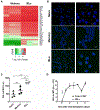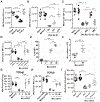Mitochondria maintain controlled activation state of epithelial-resident T lymphocytes
- PMID: 29934344
- PMCID: PMC6690060
- DOI: 10.1126/sciimmunol.aan2543
Mitochondria maintain controlled activation state of epithelial-resident T lymphocytes
Abstract
Epithelial-resident T lymphocytes, such as intraepithelial lymphocytes (IELs) located at the intestinal barrier, can offer swift protection against invading pathogens. Lymphocyte activation is strictly regulated because of its potential harmful nature and metabolic cost, and most lymphocytes are maintained in a quiescent state. However, IELs are kept in a heightened state of activation resembling effector T cells but without cytokine production or clonal proliferation. We show that this controlled activation state correlates with alterations in the IEL mitochondrial membrane, especially the cardiolipin composition. Upon inflammation, the cardiolipin composition is altered to support IEL proliferation and effector function. Furthermore, we show that cardiolipin makeup can particularly restrict swift IEL proliferation and effector functions, reducing microbial containment capability. These findings uncover an alternative mechanism to control cellular activity, special to epithelial-resident T cells, and a novel role for mitochondria, maintaining cells in a metabolically poised state while enabling rapid progression to full functionality.
Copyright © 2018 The Authors, some rights reserved; exclusive licensee American Association for the Advancement of Science. No claim to original U.S. Government Works.
Figures








References
-
- Masopust D, Schenkel JM, The integration of T cell migration, differentiation and function. Nat. Rev. Immunol. 13, 309–320 (2013). - PubMed
Publication types
MeSH terms
Substances
Grants and funding
LinkOut - more resources
Full Text Sources
Other Literature Sources
Molecular Biology Databases

